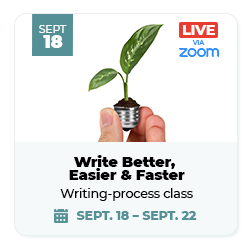Prewriting is Step 1 of the writing process
“The hard part” of writing, says playwright Tom Stoppard, “is getting to the top of page one.”

Getting to the top of page 1 is the job of prewriting, the first step of the writing process. That’s where you develop a plan for your story.
Prewriting includes everything you do to get ready to write. During prewriting, you’ll:
- Research your story. You’ve heard the phrase “hog in, sausage out.” No matter how accomplished a writer you are, your story will be no better than your material.
- Develop your story angle. Come up with the key message that will drive every paragraph, sentence, phrase and word of your message.
- Organize your piece. Spend a few minutes organizing your message upfront, and you’ll save hours agonizing over it later.
What’s not prewriting: revising and editing. That’s the last step of the writing process, called rewriting.
Why prewriting?
Prewriting will help you:
1. Craft your story. Typing isn’t writing; thinking is writing. Prewriting is where you figure out what you’re going to say. The rest is just getting words onto the page.
“My working habits are simple,” wrote Ernest Hemingway, Nobel Prize-winning novelist: “long periods of thinking, short periods of writing.”
2. Write to length. Why write a thesis when what you need is a tweet? Prewriting can help you write to length. That saves you the time you would have spent overwriting — plus the time you would have spent going back through to edit out the extra words.
“Keep it short from the initial conception,” writes Poynter Institute senior scholar Roy Peter Clark. “You can write a haiku faster than a sonnet, a sonnet faster than an epic.”
3. Get ready to write. Prewriting helps you stuff your brain with information and ideas so the back of your mind can work on your story while you’re doing the dishes. Best-case scenario: You’ll write the story in your head, so it flows from your fingers when you hit the keyboard.
“Writing is no trouble,” wrote Canadian humorist Stephen Leacock. “You just jot down the ideas as they occur to you. The jotting is simplicity itself … it is the occurring which is difficult.”
Now, on to step 2 …
Prewriting gives you a road map for the next step of the process: That’s when you free write, or get words onto the page.
Work with — not against — your brain
While we talk a lot about what to write — More stories! Fewer words! Shorter sentences! — we don’t focus so much on how.

Writing is hard because we weren’t taught how to write. Instead, we were taught how to edit: how to spell, punctuate and use the right grammar.
But there is a how to writing. Learn a few simple steps that will make your writing time more effective and efficient at How to write Better, Easier & Faster — our writing-process workshop starting Sept. 18.
You’ll learn to invest your time where it’ll do you the most good … stop committing creative incest … even save time by editing before writing.
Save up to $100 with our group discounts.
